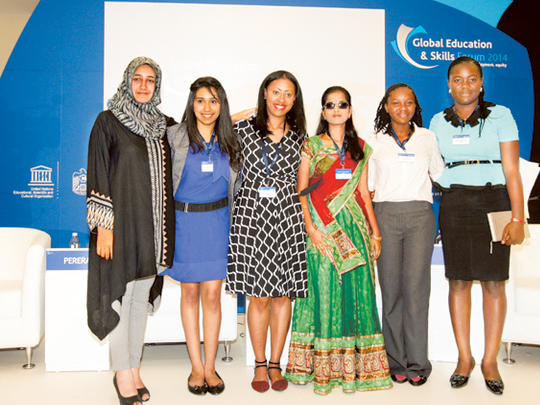
Dubai: From going undercover as a child prostitute to having a childhood friend married off to an old man for $300 (Dh1,101,) women who spoke at a session, titled “Empowering adolescent girls”, had inspirational experiences to share.
The session, part of the two-day Global Education and Skills Forum (GESF) 2014, which concluded in Dubai on Monday, emphasised the importance of educating young girls to empower them to make changes in their own communities and lead better lives.
Talking about their personal experiences, the five speakers said the common factor among all the women they met who face difficult situations was not having had an education.
Cheryl Perera, UN GEFI Youth Advocacy Group, Canada
When I was in high school, I was researching a paper, when I learned about the child sex trade. The realisation made me so angry, I started researching more until, one day, I decided that researching was not enough. I wanted to go to areas that allowed the sex trade and see it for myself.
I took three months off from high school and decided to go to Sri Lanka, where I am originally from. I was able to speak to children who were working as prostitutes. I worked with the police and went undercover as a 15-year-old prostitute. The police trained me for two months before I finally went to meet a man they had been trying to capture for a long time.
I was put up in a hotel room and when the man visited me, the police came in and arrested him. I was supposed to be happy that I had helped catch a criminal, but I ended up feeling dirty. The man had only spoken to me, but I felt violated. What, then, is the condition of the children who are actually caught up in prostitution?
I have spoken to many people working in the trade, and what was common to all of them was that they had not been to school.
How many more children should fall into this abyss before we realise the importance of education?
Bertheline Nina Tchangoue, UN GEFI Youth Advocacy Group, Cameroon
When I was 11 years old, my best friend, who was like a sister to me, stopped attending school. After two weeks of no contact, she finally sent me a letter saying her father had married her off to his 61-year-old friend for $300.
I felt ill after reading the letter. I showed my father the letter and told him I would not go back to school until my best friend, also, went back to school. My father contacted his activist friend and they arranged for her to attend school again.
After this incident, I started a girl’s rights programme in school and became passionate about advocacy for women’s rights.
Ashwini Angadi, Leonard Cheshire Disability Young Voices, India
As a blind person living in India, I have faced many difficulties. I was not accepted into an integrated school and was treated poorly by relatives. All my life, I have faced rejection, which further motivated me to pursue my education. I was among the lucky ones who was able to get an education, but I have met women with disabilities who have been sexually abused, thrown out by their families and poorly treated. For this reason, I decided to fight for the rights of women with disabilities.
Aminata Palmer, youth advocate, Sierra Leone
In school, I had signed up for acting classes and, one day, our class went on a trip to a rural area. There, I saw a girl and her brother who were almost starving to death (due to having no way of sustaining themselves). That changed my perspective. I want to fight for women’s rights, because they face more difficulties than men as they grow older. Education is important, because when women are uneducated they don’t know their rights. I was the first woman to go to college in my village. I broke the chain in my family and my community made it possible for me.
Anusheh Bakht Aziz, UN GEFI Youth Advocacy Group, Pakistan
I decided to fight for women’s rights for education because my mother used to work in a private shelter, and the women who came to it were all uneducated and, as a result, they did not know what their rights were and who they should talk to. This (lack of knowledge) is one of the main reasons they were caught up in their situation in the first place.












